Environmental Responsibility
Biodiversity
Basic Approach
The Ryohin Keikaku Group has been promoting environmentally friendly manufacturing practices by utilizing appropriate materials. This is because the company recognizes the close relationship between business activities and the global environment and considers reducing the burden on the natural environment and its living beings as a critical issue. The Ryohin Keikaku Group understands the importance of halting and reversing the loss of biodiversity to put nature on a recovery track and supports the Kunming-Montreal Biodiversity Framework (KMGBF). The Group will minimize the impact of its business activities on ecosystems and promote biodiversity conservation. The Group also regularly assesses and monitor risks to biodiversity, its dependence on and impact on biodiversity, and disclose them transparently in accordance with international standards and frameworks for biodiversity conservation.
Management Organization
The Ryohin Keikaku Group systematically conducts and facilitates environmental management.
Goals
We aim to eliminate deforestation caused by resource extraction from designated protected areas under the law, and our goal is to use sustainably sourced materials for all products that use palm oil, timber, and cotton sold domestically by 2050. Our wool and down raw materials are sourced with consideration for animal welfare.
Palm Oil
We conduct regular surveys to ensure traceability of the origin and promote initiatives for the sustainable use of palm oil by verifying origin certificates and other means.
In December 2023, we became a member of JaSPON (Japan Sustainable Palm Oil Network) to gather information and move toward the future procurement of certified palm oil.
Cotton
We consider biodiversity conservation, conscientiously ensure traceability to the point of origin, and promote the procurement of sustainable cotton. We are committed to environmentally responsible manufacturing and considerate of the producers.
Paper and Wood
For MUJI products and MUJI HOUSE residences, we aim for sustainable procurement of wood and paper materials*1 and have set a goal of achieving 100% utilization of certified materials related to forestry (FSC, PEFC, SGEC) or materials that comply with environmental laws on logging in each country and region by 2030. To achieve this goal, we conduct investigations into legal logging practices and self-assessments (wood due diligence) to ensure that we do not use wood associated with deforestation caused by illegal logging and similar activities.
For fixtures, interiors, and exteriors at our stores in Japan, we actively utilize domestic and regional timber to support the stability of the timber and forestry industries. In May 2023, Ryohin Keikaku Co., Ltd. and MUJI HOUSE Co., Ltd. signed the "Agreement on Promoting the Expanded Use of Timber in Buildings" with Japan's Ministry of Agriculture, Forestry, and Fisheries. Under this agreement, we aim to use approximately 10,000 m³ of domestic timber over five years and ensure the use of legally verified wood in compliance with Japan's Clean Wood Act. By promoting the use of domestic timber, we contribute to the realization of a decarbonized society. Additionally, by sourcing raw timber and processing products locally for stores in each region, we aim to support regional wood industries.
*1. Excludes wood at the end of its lifecycle, paper made from non-wood pulp, and cardboard.
Initiatives Related to Wood
Utilization of Regional and Certified Timber for Store Fixtures, Interiors, and Exteriors
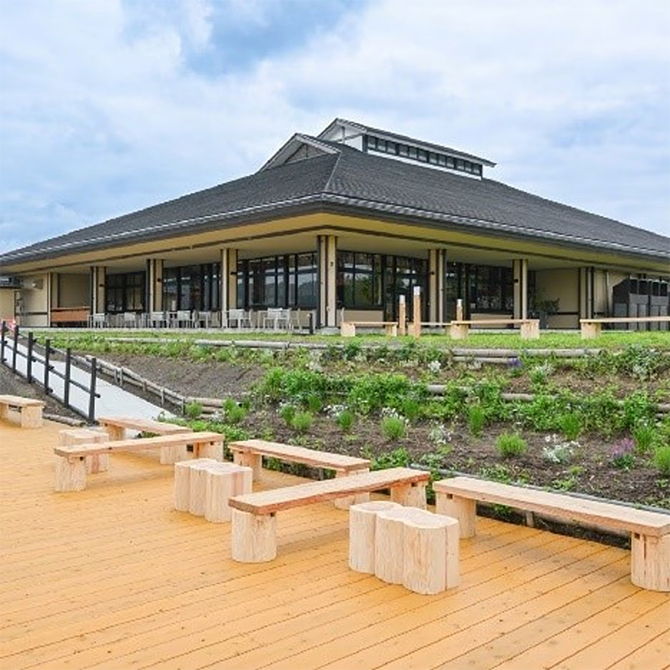
Wooden deck of "Sato's MUJI Minnami no Sato"
Ryohin Keikaku actively promotes the use of regional timber in the interiors and exteriors of MUJI stores. Timber has always been one of the core natural materials--along with "wood, metal, and earth"--that form the foundation of MUJI stores. By using natural materials such as timber for store fixtures, including shelving boards, wall materials, and pillars, we create store spaces that can be enjoyed for years through their unique aging process.
In particular, by utilizing distinctive timber grown in each region, we aim to create opportunities for visitors to reflect on the natural resources of those areas. We also procure timber directly from nearby sawmills and processing factories, carrying out everything from raw timber procurement and processing to supply regional stores within each region. Through this approach, we contribute to the development of local timber industries.
In September 2024, we began using certified timber (FSC, PEFC, SGEC) for store fixtures, strengthening our commitment to responsible wood procurement.
Wooden Stores Utilizing Spatial Design Expertise
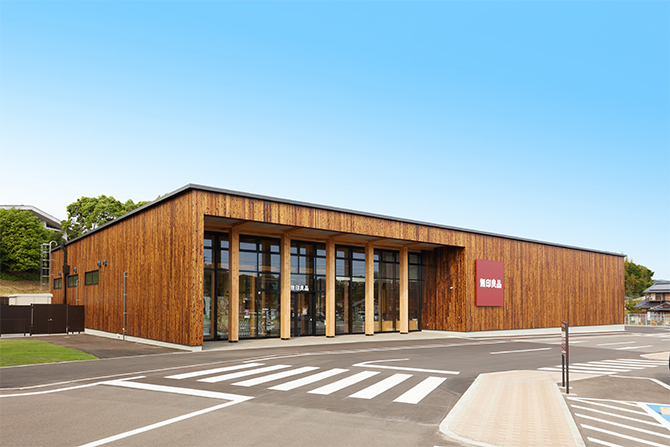
"MUJI Karatsu"
In September 2024, Ryohin Keikaku opened its first-ever wooden MUJI stores in Karatsu City, Saga Prefecture, and Hita City, Oita Prefecture. In May 2023, we signed the "Agreement on Promoting the Expanded Use of Timber in Buildings" with Japan's Ministry of Agriculture, Forestry, and Fisheries. Based on this agreement, we have been working to promote wooden structures and wooden interiors in buildings, utilizing the network and expertise in timber utilization developed through the Ryohin Keikaku Group's spatial design business.
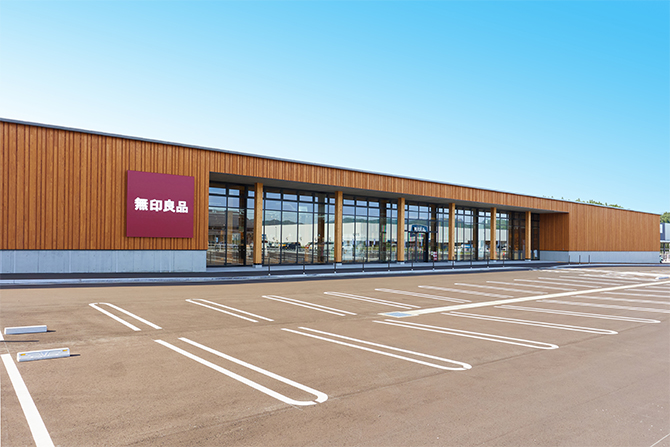
"MUJI Hita"
For the construction of MUJI Karatsu and MUJI Hita, our group company MUJI HOUSE Co., Ltd. was responsible for the design. The stores feature the "SE Structure," a wooden rigid-frame structure known for its excellent earthquake resistance, which is also adopted in residential buildings from MUJI HOUSE. By combining energy-saving and energy-generating technologies, the stores achieved "ZEB2 certification. Compared to conventional steel-framed MUJI stores, these wooden stores reduce CO₂ emissions during material production by 44%.3 Moreover, when considering the entire lifecycle--from material production to construction, maintenance, disposal, and recycling (excluding the usage phase)--CO₂ emissions are reduced by 35%3 compared to steel-framed stores.
Moving forward, we will continue to utilize the spatial design expertise of the Ryohin Keikaku Group and actively promote the use of timber in MUJI stores and other buildings.
*2. ZEB stands for "Net Zero Energy Building," referring to structures designed to achieve zero or negative annual primary energy consumption. "MUJI Karatsu" and "MUJI Hita" has obtained "ZEB" certification at the level of representing the lowest energy consumption in the four-tier ZEB evaluation system. This certification is based on the performance evaluation under BELS (Building-Housing Energy-efficiency Labeling System), and the two buildings were certified on January 10, 2024.
*3. The CO₂ reduction rates were calculated using the "One Click LCA" carbon assessment software, with a simplified evaluation conducted by New Constructor's Network Co., Ltd. These figures are provisional and may be revised in the future. The reduction rates are based on CO₂ emissions per square meter of building area.
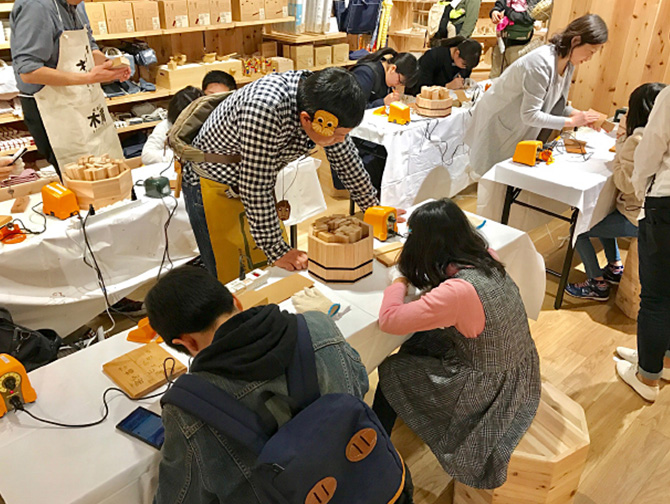
Activation of MOKUIKU (teaching about woods through wooden toys) activities that originated in Hokkaido (MUJI SHARE STAR Hakodate)
The Hokkaido Government Oshima General Subprefectural Bureau and MUJI SHARE STAR Hakodate are working on collaborative projects related to the dissemination and promotion of MOKUIKU while mutually cooperating through public-private collaboration toward the revitalization of MOKUIKU activities that originated in Hokkaido. Since its opening in April 2016, we have hosted monthly workshops and events related to MOKUIKU such as tree planting to foster an understanding of MOKUIKU. We are strengthening cooperation with relevant organizations that support the MOKUIKU initiative.
Other Initiatives
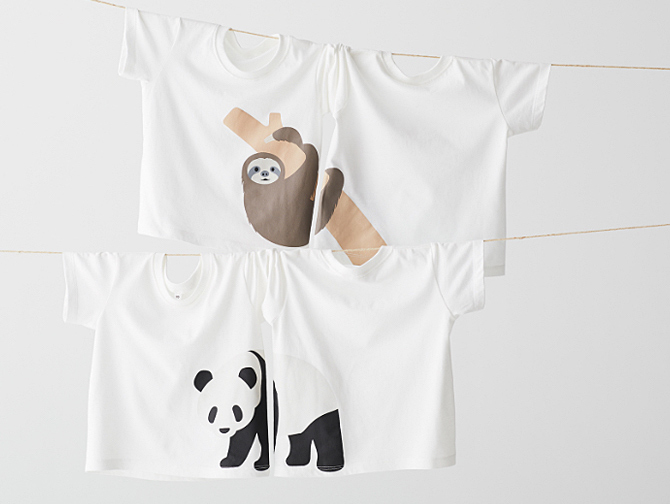
T-shirts for Children Printed with Endangered Species as a Motif
We have added a new series of endangered species to the printed T-shirts for children that have been designed with the motif of creatures you can meet at MUJI campsites. We donate part of the sales to the IUCN-J (Japan Committee for International Union for Conservation of Nature). We hope having children wear these T-shirts will lead to activities aimed at protecting creatures that are the motif and, at the same time, provide an opportunity for them to become interested in the situation in which those creatures are placed.
